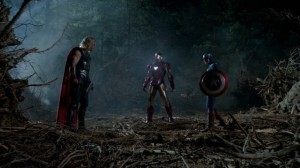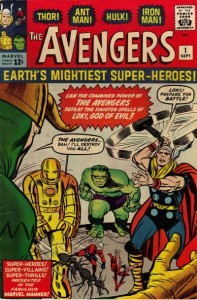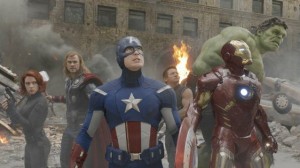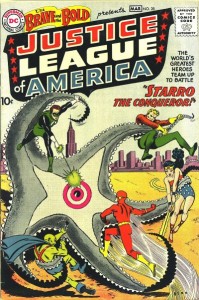Real life conspired to delay my gratification, but yesterday, ten days after its nationwide American release, I finally saw The Avengers.
By now, reams* have been written about how good the movie is, how thoroughly it entertains on multiple levels thanks to its snappy Whedonesque dialogue, its insightful Whedonesque explorations of character relationships, and its shameless Whedonesque joy in simple comic-book-y superhero shenanigans.
(*that’s how we used to measure that old-fashioned non-perishable hardcopy medium called “paper”, kids)
I’m not going to add review number 1,415,038 to the Internet’s cluttered attic. It is indeed as thoroughly amazing as you’ve heard, and for a review I completely agree with I direct you to J’s spoiler-free review here on Podwits.com.
Instead, I’m here to share a couple of thoughts the film inspired in me, from the perspective of a long-time fan of the Avengers franchise and superhero comics in general.
The Thrill
As others have pointed out, the greatest strength of The Avengers is its success as an accessible action movie for “mainstream” audiences, which means the (theoretical) majority of filmgoers who aren’t life-long readers, collectors, and cataloguers of superhero comics and the countless details they contain. What hasn’t been pointed out, though, is the subversive way in which it provides, for that “mainstream” audience, a pretty concentrated dose of exactly the sort of imaginative experience that turned people like me into members of that other camp—the comic book geeks—in the first place.
For the majority of their history, superhero comic books were aimed at kids, and as long as kids have read comics they’ve been debating (using insightful argumentation like “stinkybreath” and “poopoo-head”) the relative strengths and weakness of the superheroes they contain. Think of the great Superman vs. Mighty Mouse debate from Stand by Me.
So imagine you’re a typical twelve-year-old in 1963, who for months (which, at age twelve, feel like years do to us grown-ups) has been digesting the thrilling adventures of Iron Man (in Tales of Suspense), Thor (in Journey into Mystery), and the Incredible Hulk. These characters have fired your imagination and quickly taken up residence in the deep belief centers of your brain; you’re no longer asking “what if the Hulk existed?” Of course he exists, in your own mind. What you wanna know is what would happen if the Hulk ever met Thor.
Imagine, then, your glee in the summer of 1963 when that totally happened. Stan Lee and Jack Kirby clearly read your twelve-year-old mind and made your wish into reality. There on the page, in the trusted four colors that have come to mean “truth” to you, are Iron Man, Thor and the Hulk, standing back to back to back against the god of evil, Loki. (Okay, okay, Ant-Man and the Wasp were there, too, but I’m not sure their double-feature in Tales to Astonish ever got the kind of traction that the other heroes’ stories did; their existence was mostly rooted in the Avengers for the most part.)
Well, you don’t need to imagine it any longer, because everyone, fan and non-fan alike, has been given that very experience thanks to the patience and boldness of Marvel Studios’ long-term planning and commitment to their film-universe project, and the reliable people-oriented storytelling skills of Joss Whedon. After hordes of folks (if box office results are to be believed) enjoyed two Iron Man movies (the first a candidate for best superhero movie ever and the second less stellar but still good), a slightly questionable Hulk movie, a strange but really enjoyable Thor movie, and a very good Captain America movie, these characters had movie lives of their own.
And when (spoiler alert! …just kidding, this isn’t a spoiler by dint of the name of the movie) those heroes—along with Ant-Man Hawkeye and the the Wasp Black Widow—stand together on one screen in all of their massive, superheroic, “hey, we saw all these guys in other films on their own” glory, the grin that stretched across my face was a manifestation of exactly the same thrill that our theoretical twelve-year-old experienced in 1963. I’m positive that countless people seeing this film without a life-long background in comic book universes and crossover team-up events sported the same grin and felt the same thrill. It wasn’t easy, but I firmly believe Marvel and Whedon have given an essential fan experience to non-fans, and for that I say bless them all, every one.
Follow the Leader
All of this leads me to wonder if DC Comics and their masters at Warner Bros. couldn’t pull off exactly the same feat.
I know, I know, everyone criticizes Hollywood for being lemming-like followers and never having an original idea, but in this case I feel it wouldn’t be so much copying someone else’s idea as it is recognizing a worthwhile storytelling mode that someone else pioneered and making use of it.
(Slight digression: The absolute dumbest comment anyone has made about The Avengers was in Will Leitch’s review on Deadspin:
“The Avengers is a superhero movie so fun, full of so much pure fanboy-wank joy wrapped up in an accessible, relentlessly entertaining package, that I’m not sure anybody needs to make any more comic-book movies; this one might wrap it up.”
By that logic, no one should have made any more romance films after Gone With the Wind, or recorded any more rock albums after Who’s Next, or written any more science fiction novels after Ender’s Game. Genres don’t only exist until someone “gets it right”, Mr. Leitch. Okay, rant over.)
I don’t think it’s a minority opinion that, Christopher Nolan’s well-crafted but grim grim grim Batman films aside, DC’s superheroes haven’t fared too well on the big screen of late. Green Lantern was an out-of-control, CG-splattered mess, and our own J. Marcus has pointed out the flaws in 2006’s Superman Returns and his fears about the upcoming Man of Steel.
I think their situation could be saved, though. DC has a venerable superhero team of its own—the Justice League’s comic book debut actually predates the Avengers’ by three years—and with Ryan Reynolds and Henry Cavill presumably under contract for further Green Lantern and Superman movies, they’ve got the beginnings of a cast. If DC were to employ the patience and planning that Marvel did, with a Batman reboot that was designed to play better with others than the Nolan films, and maybe slightly smaller scale films establishing heroes like Wonder Woman and the Flash (much like Marvel did with Thor and Captain America), DC could create a filmic superhero universe to compete directly with Marvel. [Admittedly, DC is at a bit of a creative disadvantage, historically; while Marvel was able to craft a brilliant Avengers ur-version for the film by combining the original Lee/Kirby iteration with the recent iconic innovations made by Brian Bendis in the New Avengers titles, like Stark Tower, and Mark Millar in the Ultimates, like Samuel L. Fury, I don’t know that the Justice League has a comparably iconic version in their past unless you count the hilarious reinvention by Keith Giffen and J.M. DeMatteis in the late 1980s.]
Not only might such a unifying vision give a qualitative shot in the arm to DC’s struggling creativity in the movie realm, but much as it has for their comic book properties at several times in the past, competition between Marvel’s and DC’s universes on the big screen could push both to greater artistic successes and, due to the inevitably increased cultural relevance of such big endeavors in the Age of the Comic-Con, long-term commercial rewards as well.
That would be good for all us fans, I think. Could it happen? Dare we dream?
I do dare…




[…] It’s The Avengers’ World Now […]